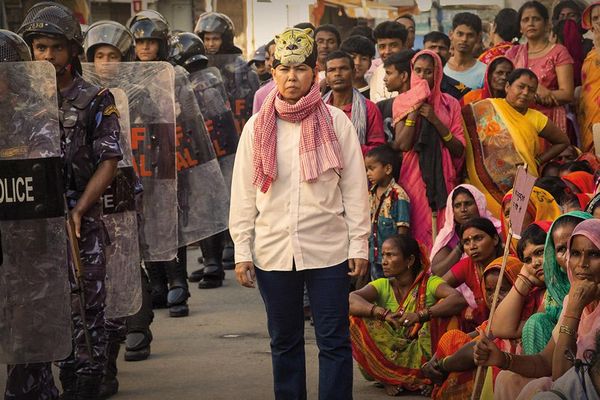Eye For Film >> Movies >> Pooja, Sir (2024) Film Review
Pooja, Sir
Reviewed by: Amber Wilkinson

Set against the backdrop of 2015 unrest in Nepal, which saw people from the Madhesi community rise up in protest against a new constitution on discrimination grounds, this crime-driven thriller from director Deepak Rauniyar is “inspired by real experiences of the filmmakers”. The sociopolitics is a complex affair but Rauniyar and his co-writers David Barker and Asha Magrati, who also stars, draw on a reportage style, which pays dividends in terms of tension.
Detective Inspector Pooja Thapa (Magrati, who is married to Rauniyar and a frequent onscreen collaborator) is a no-nonsense sort. She might be a woman in the men’s world of policing but she prefers male pronouns and binds her breasts before heading off to work. Newly deployed from Kathmandu to a border town in the middle of the, often violent, demonstrations, she has been drafted in to hunt the kidnappers of two young boys, one of whom is the son of the local school’s headmistress (Reecha Sharma) and her congressman husband.
As a power couple, answers are being demanded fast and Pooja gets on the case with local officer Mamata (Nikita Chandrak), who also happens to be from the Madhesi community. Mamata’s competence and position in the police force don’t exclude her from facing discrimination because of her background, with Madhesi’s easily targeted because of the perceived darkness of their skin tone.
As the women begin to dig into the case, questions about the school start to emerge as the hunt for the children plays out against a complex web of societal inequalities and prejudices. The close proximity camerawork employed by Sheldon Chau, coupled with the fact that the frame is often reduced by foreground intrusions, lend Pooja, Sir an intense and often claustrophobic feel. Rauniyar also proves adept at handling street scenes, particularly in a sequence where a ransom is set to be paid. The camera is in the thick of it, while the employment of large numbers of extras for crowd scenes adds to the general unsettling feeling in terms of the thriller’s volatile backdrop. The score from Vivek Maddala, flavoured with local instruments, also brings tension and depth. Colour, too, is well deployed, with burnished oranges and reds - from saris to flames - standing out against the darker environments, particularly interiors, which have a generally shadowy vibe.
It’s fair to say that the complexity of the various strands of discrimination, particularly surrounding caste and community, is likely to be best appreciated by local audiences, though there’s enough detail for worldwide viewers to get the general picture. There’s also an admirable sense of ambition in the attempt to tackle a range of gender issues, although a subplot involving Pooja’s girlfriend Rama (Gaumaya Gurung) and the police officer’s ailing father gets rather lost in the shuffle. While not everything may pay off in terms of character development, the ensemble performances from the cast, including Dayahang Rai, are strong and the central case plays out with style.
Reviewed on: 29 Aug 2024
















